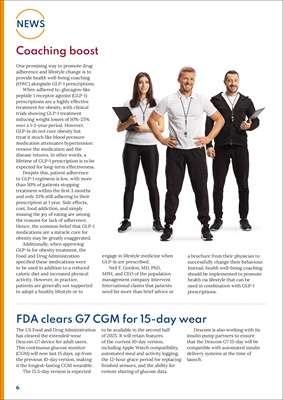
6
NEWS
Coaching boost
FDA clears G7 CGM for 15-day wear
The US Food and Drug Administration
has cleared the extended-wear
Dexcom G7 device for adult users.
This continuous glucose monitor
(CGM) will now last 15 days, up from
the previous 10-day version, making
it the longest-lasting CGM wearable.
The 15.5-day version is expected to be
available in the second half of 2025. It
will retain features of the current 10-
day version, including Apple Watch
compatibility, automated meal and
activity logging, the 12-hour grace
period for replacing finished sensors,
and the ability for remote sharing of
glucose data.
Dexcom is also working with its
insulin pump partners to ensure
that the Dexcom G7 15-day will be
compatible with automated insulin
delivery systems at the time of
launch.
One promising way to promote drug
adherence and lifestyle change is to
provide health well-being coaching
(HWC) alongside GLP-1 prescriptions.
When adhered to, glucagon-like
peptide 1 receptor agonist (GLP-1)
prescriptions are a highly effective
treatment for obesity, with clinical
trials showing GLP-1 treatment
inducing weight losses of 10%-25%
over a 1-2-year period. However,
GLP-1s do not cure obesity but
treat it much like blood pressure
medication attenuates hypertension:
remove the medication and the
disease returns. In other words, a
lifetime of GLP-1 prescription is to be
expected for long-term effectiveness.
Despite this, patient adherence to
GLP-1 regimens is low, with more
than 50% of patients stopping
treatment within the first 3 months
and only 33% still adhering to their
prescription at 1 year. Side effects,
cost, food addiction, and simply
missing the joy of eating are among
the reasons for lack of adherence.
Hence, the common belief that GLP-1
medications are a miracle cure for
obesity may be greatly exaggerated.
Additionally, when approving GLP1s for
obesity treatment, the Food
and Drug Administration specified
these medications were to be used in
addition to a reduced caloric diet and
increased physical activity. However,
in practice, patients are generally not
supported to adopt a healthy lifestyle
or to engage in lifestyle medicine
when GLP-1s are prescribed.
Neil F. Gordon, MD, PhD, MPH, and
CEO of the population management
company Intervent International
claims that patients need far more
than brief advice or a brochure from
their physician to successfully
change their behaviour. Instead,
health well-being coaching should
be implemented to promote
health via lifestyle that can be
used in combination with GLP-1
prescriptions.